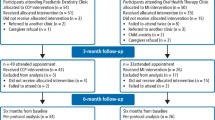Abstract
Design This study was a randomised controlled trial (RCT) designed to evaluate the effectiveness of three school-based interventions to improve the oral health behaviours of adolescents and prevent dental caries. Participants were assigned to one of three groups: Group I - oral health education (which was considered as usual care); Group II - motivational interviewing (MI); and Group III - MI aided by the interactive patient communication tool, the Cariogram. Cluster randomisation was applied and schools were stratified by district. The interventions were delivered at school by trained hygienists. The main outcome measures were psychological (self-efficacy) and behavioural measures about snacking and toothbrushing with clinical measures of plaque and caries.
Case selection Participants were selected from 15 secondary schools located in three main districts in Hong Kong in 2015-16. Inclusion criteria were: full-time students enrolled in participating schools; 12 or 13 years old; and having unfavourable oral health behaviour, defined as 'toothbrushing less often than twice a day' and/or 'snacking three times or more a day'. Eligible participants were identified through a screening questionnaire.
Results In total, 512 participants were recruited (161, 162 and 188 in Groups I-III, respectively) and of those, 460 (89.9%) were followed-up 24 months post intervention. When compared with Group I, restriction of frequent snacking was more likely in Group II (odds ratio [OR] [95% confidence interval (CI)]: 3.91 [1.48-10.33]) and Group III (OR [95% CI]: 6.33 [2.46-16.27]). Participants in Group III had a higher likelihood to start performing adequate toothbrushing (OR [95% CI]: 4.80 [1.79-12.85]). No significant reduction in plaque score reduction was found among the three groups (p >0.05). Groups II and III developed fewer teeth with caries into dentine (β [95% CI]: −0.19 [−0.37, −0.01] and −0.20 [−0.38, −0.02], respectively), whereas the increment of total carious lesions (enamel and dentine) was lower in Group III (β [95% CI]: −0.63 [−1.24, −0.02]).
Conclusions The findings of this RCT suggest school-based MI interventions were more effective than traditional oral health education in improving adolescents' oral health self-efficacy, behaviours and preventing dental caries. The authors suggest the benefits of this intervention may potentially extend beyond caries prevention to other oral and systemic diseases.
This is a preview of subscription content, access via your institution
Access options
Subscribe to this journal
Receive 4 print issues and online access
$259.00 per year
only $64.75 per issue
Buy this article
- Purchase on Springer Link
- Instant access to full article PDF
Prices may be subject to local taxes which are calculated during checkout
Similar content being viewed by others
Author information
Authors and Affiliations
Ethics declarations
The authors declare no conflicts of interest.
Rights and permissions
About this article
Cite this article
Watt, S., Marshman, Z. Can motivational interviewing help prevent dental caries in secondary school children?. Evid Based Dent 23, 56–57 (2022). https://doi.org/10.1038/s41432-022-0261-z
Received:
Accepted:
Published:
Issue Date:
DOI: https://doi.org/10.1038/s41432-022-0261-z



